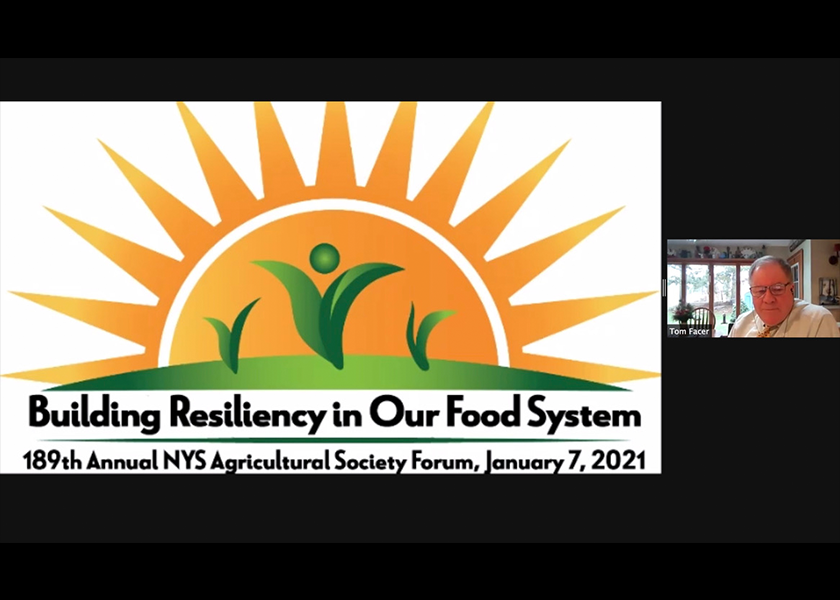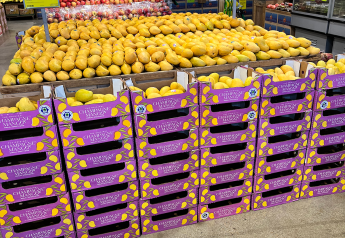NY Ag Forum: How companies can be resilient

Retail solutions from the COVID-19 pandemic may remain long-term — a more diversified supplier base, fewer stock-keeping units and technology to replace human labor, said Martha Hilton, vice president of produce and floral at Rochester, N.Y.-based Wegmans Food Markets.
Hilton was one of two keynote speakers at the opening session of the 189th annual New York State Agricultural Society Forum, themed “Building Resiliency in our Food System” for 2021.
“If we had relied on only one supplier for our bagged salads and they shut down, we would’ve had nothing. And with 104 stores, that’s unacceptable,” Hilton said. “Supply challenges are not going away.”
The Jan. 7 forum was the first virtual event the society has hosted.
The other morning keynote was Tom Facer, president and CEO since 2007 at Farm Fresh First, a management company that works with growers to supply fruits and vegetables to processors. He has more than 40 years in the fruit and vegetable industry, supplying companies that include Seneca Foods, Curtice Burns and Birds Eye. Facer is also Hilton’s father.
U.S. Department of Agriculture purchases are continuing at unprecedented levels, which is definitely helping producers, as well as the food bank recipients and others who receive the food, he said.
State food assistance programs received more funding nationwide, including Nourish New York, which received $35 million to help farmers and food bank consumers.
The Farm Bureau Federation reports that the public has much more trust in farmers, he said.
“We should all be happy about that and also use the opportunity to improve on that,” Facer said.
Family visits to farmers markets and pick-your-own farms have risen dramatically nationwide, exposing more young people to agriculture.
“We need to do a better job of teaching people of where their food comes from,” he said.
Another possible long-term effect of the pandemic is that local foods are perceived safer because they were touched fewer times.
“We all know food on trucks traveling long distances probably isn’t touched more, but we should still take advantage of that,” Facer said.
There are continuing concerns, as well.
Winter and spring could see another wave of COVID-19 infections, with potent new strains, which can cause more shutdowns and interrupt product flow yet again, he said.
With lower inventories compared to March 2020, the supply chain could be disrupted even more than the first time.
“We’re pretty much hand to mouth, so if this comes again, there could be significant issues,” Facer said.
The skyrocketed use of online shopping has greatly reduced in-store impulse purchasing, making product innovations more difficult to convey to consumers, he said.
That means it’s more difficult to return the cost of investments in innovation.
“I think product innovation will slow down for a while. The time just isn’t right,” Facer said.
However, the food industry has learned to adapt with distancing guidelines at facilities, and the food supply is safe.
Like Hilton, he expects to see more money spent to mechanize food supply as wages keep increasing.
Wegmans partnered with restaurant suppliers and increased direct deliveries from suppliers to solve supply chain issues, Hilton said.
The retailer also gave employees more uninterrupted time to restock and deep-clean by closing the previously 24-hour stores from midnight to 6 a.m.
And then Wegmans established restrictions on the quantities customers could purchase.
“We never thought we’d limit the amount customers could buy, but we wanted to service as many customers as possible, have product throughout the day and slow the movement,” Hilton said.
As far as produce, Wegmans’ largest growth categories have been convenience produce and salad vegetables. The retailer’s most significant category decreases have been — unsurprisingly — self-serve bars, chef’s cases and catering.
Hilton found it remarkable how fast consumers shifted to shopping online. Wegmans shifted a lot of employees toward those jobs, to adapt to the change. Wegmans staff does the shopping for curbside pickup consumers too.
It will take time for consumers to trust and enjoy the entertainment value of in-store shopping and for Wegmans to figure out how to encourage impulse purchases and more variety in digital shopping.
“Just because it worked the past many years, doesn’t mean it’s going to in years going forward. That excites me,” Hilton said.







